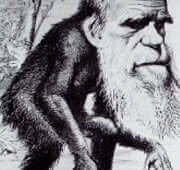Find out how Darwin’s ‘The Origin of Species‘ changed the world

It was published 150 years ago, on Nov. 24, 1859. At that time, scientists believed the universe had been intelligently designed by a divine creator.
But Darwin’s theory that life evolved through random mutation and natural selection over millions of years flipped the predominant worldview upside down.
“Darwin’s theory had the impact of changing the basis of Western Civilization from a Judeo-Christian perspective to a secular-humanist perspective,” says Norman Geisler, who for 50 years has been a professor of apologetics. “The culture was based on belief in God and God’s moral law, and Darwin undermined that and gave us a culture that is literally without God or any absolute moral law.”
Darwin borrowed a phrase from economist Herbert Spencer, “survival of the fittest.” That concept, Geisler says, led to social Darwinism and eugenics, movements that advocated breeding better humans through racial purity, forced sterilization and weeding out “defectives.”
These ideas were later adopted by Adolph Hitler, resulting in the Holocaust.
“People don’t realize the Nazis developed shower stalls that were gas chambers for gassing handicapped children,” says John West, a senior fellow at the Discovery Institute, an intelligent design think tank in Seattle. “They did this explicitly for eugenics’ reasons.”
After World War II and the forced sterilizations of tens of thousands of Americans, the term “eugenics” gained a negative reputation. But it re-emerged in the 1950s with proponents of birth control who coined the phrase “freedom of choice.”
Says West: “So you find a big component of early efforts to legalize abortion from the eugenics movement for whom survival of the fittest was a key part of their ideology.”
Despite decades of evolutionary teaching in the schools, polls show nearly two-thirds of Americans believe creationism should be taught alongside evolution in public schools and more than 50 percent believe God created humans in their present form. Another 30 percent believe God guided the process of evolution.
Nevertheless, most textbook writers and university science professors are atheistic evolutionists, and evidence for intelligent design, young earth and old earth creationism and theistic evolution is rarely presented to students.
“I think the way to understand evolution is that it is a worldview,” says John Morris, president of the Institute for Creation Research in Dallas.
“It’s a way of thinking that impacts everything we see in our society today. It seems like all the various ‘-isms’ that have devastated our society go back to evolution for their foundational principles.”
—TROY ANDERSON














































